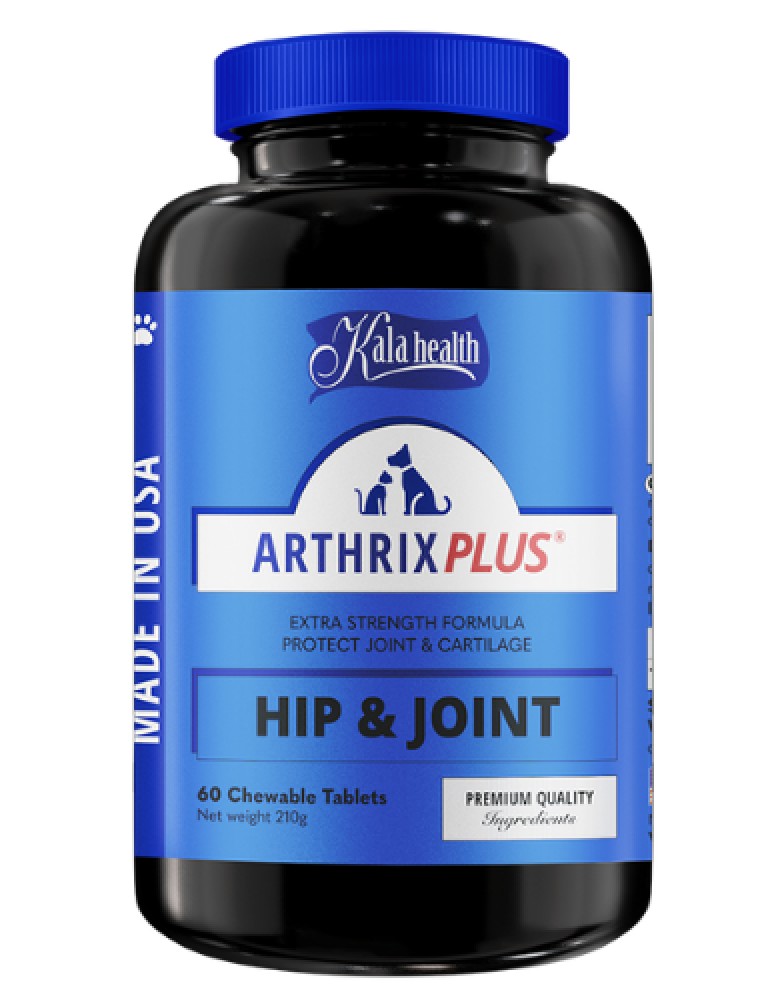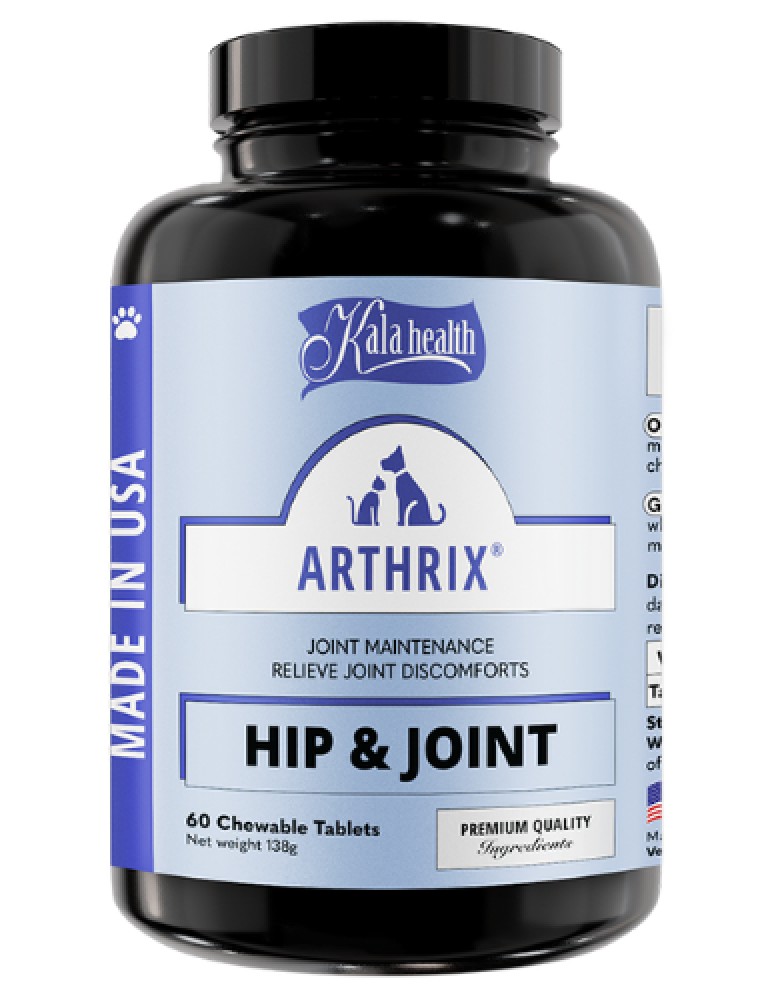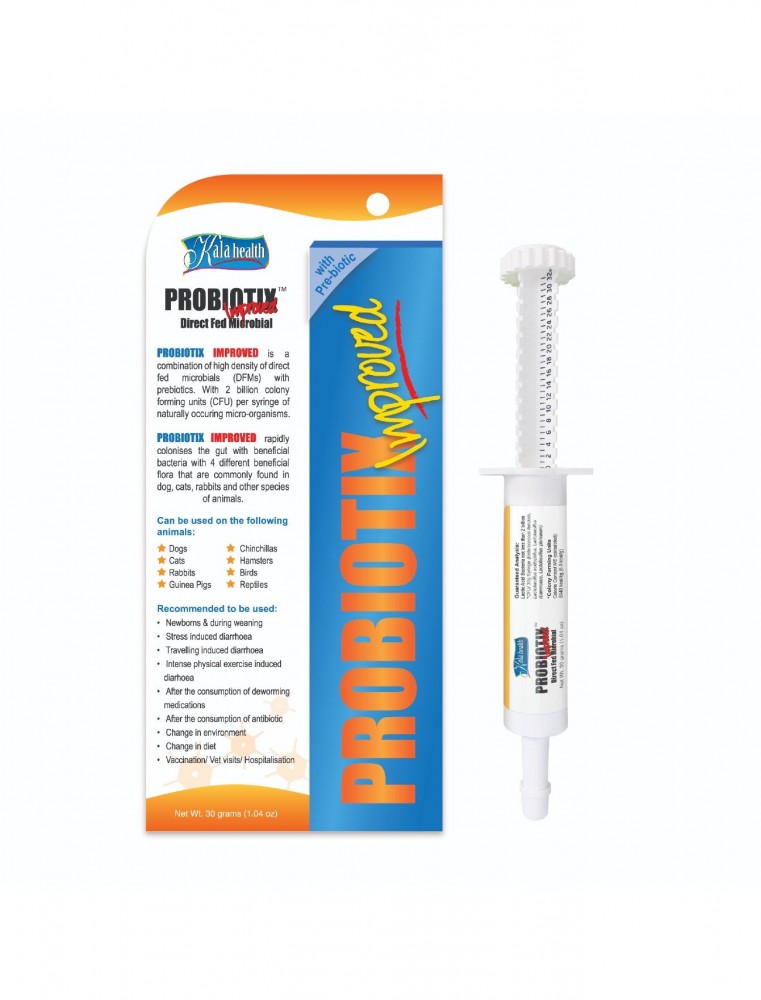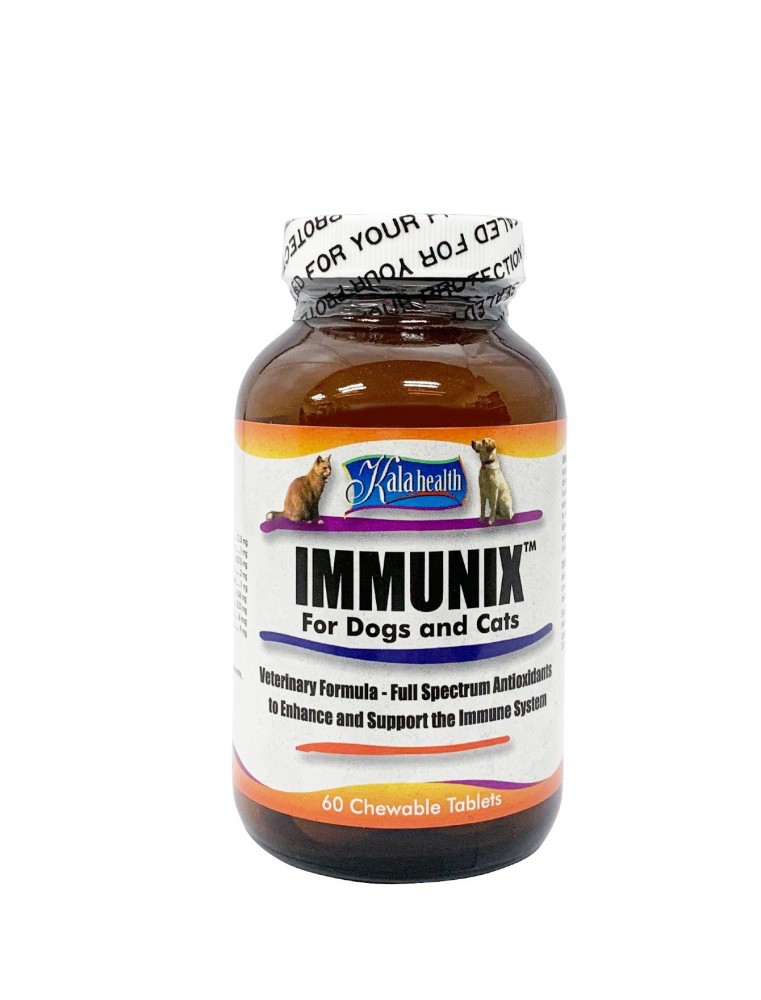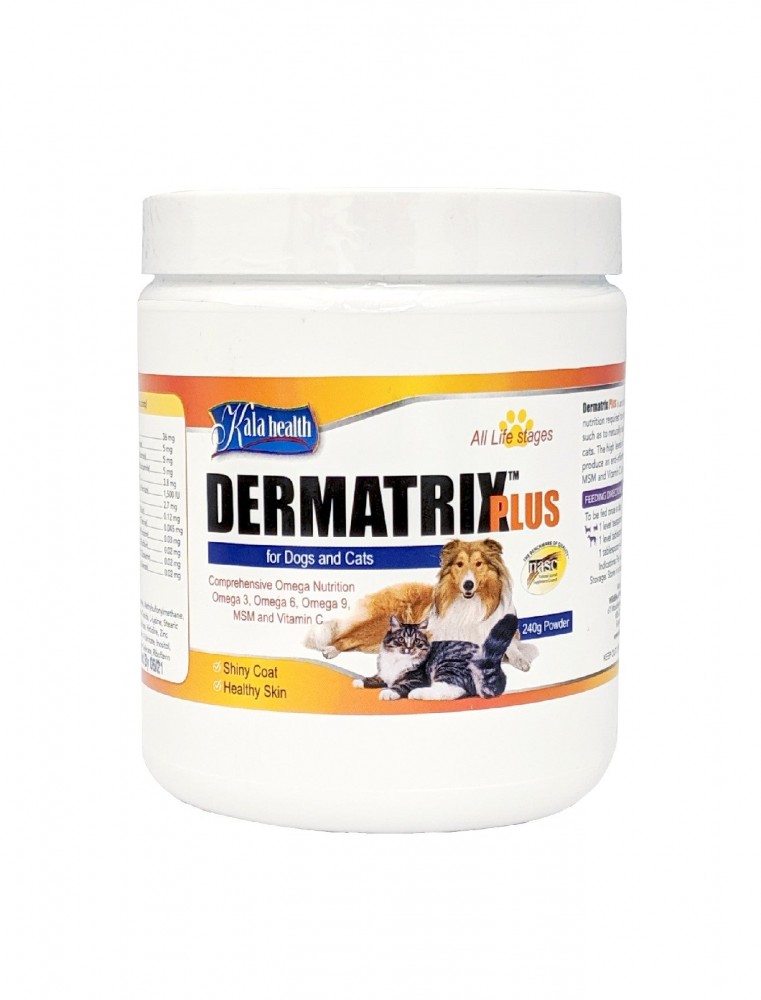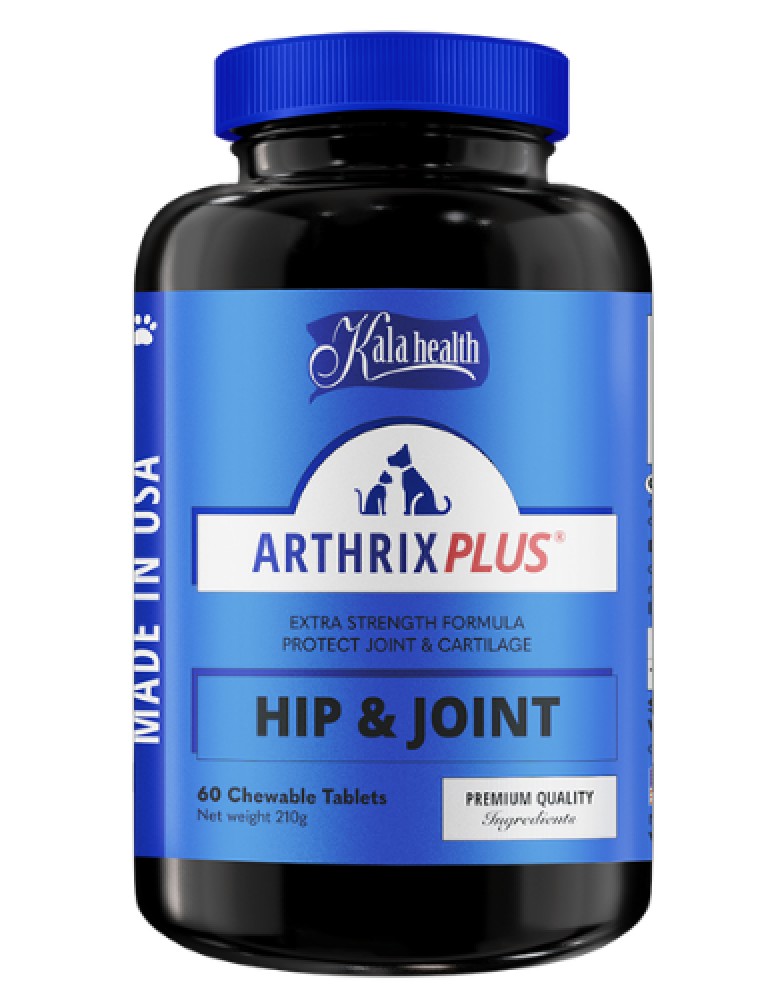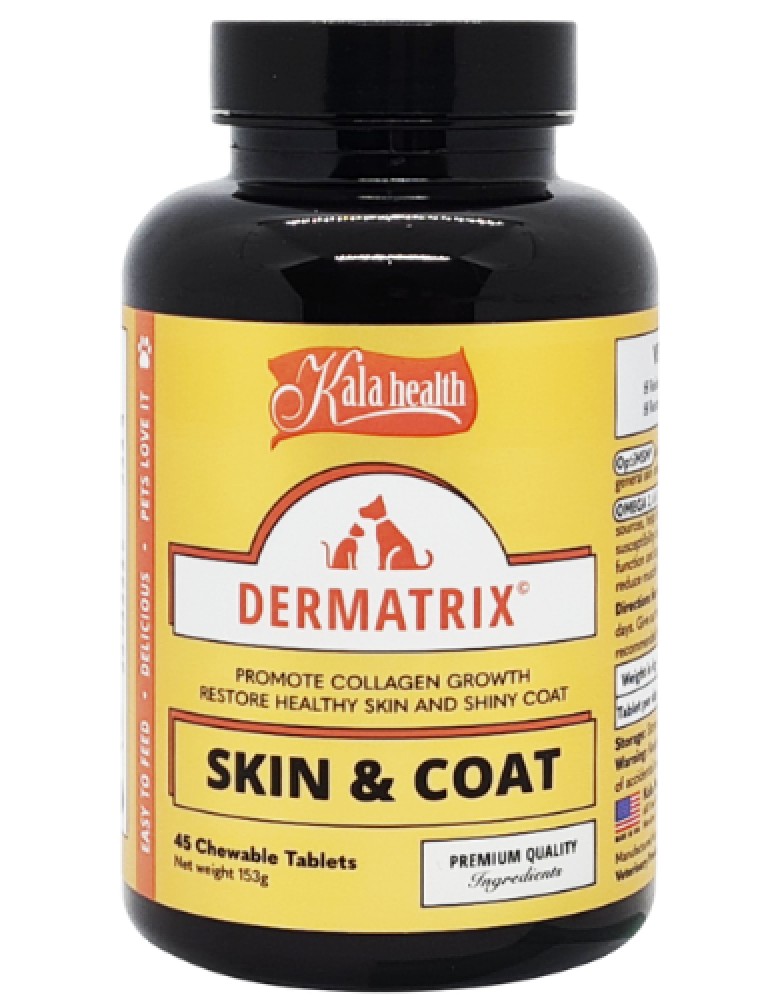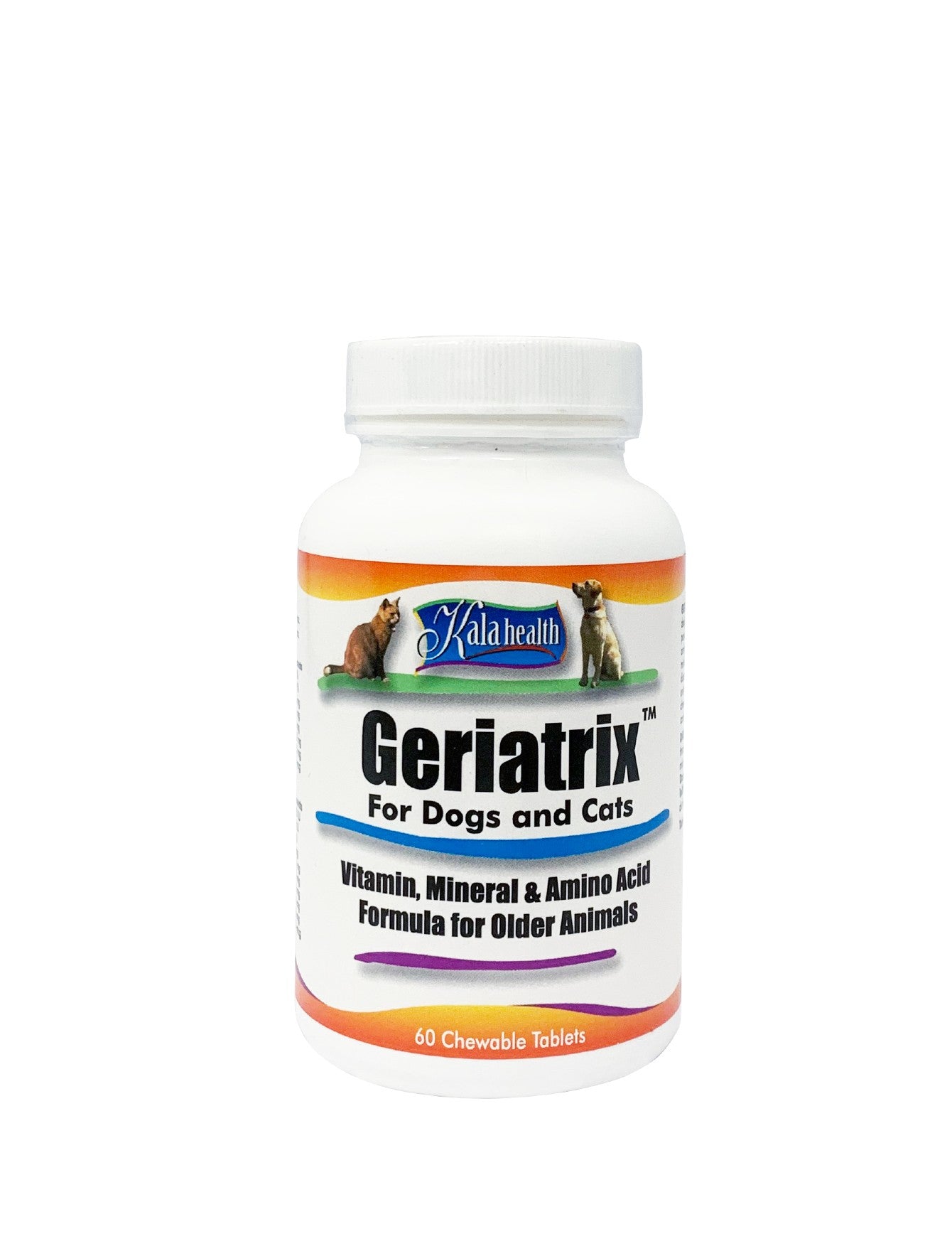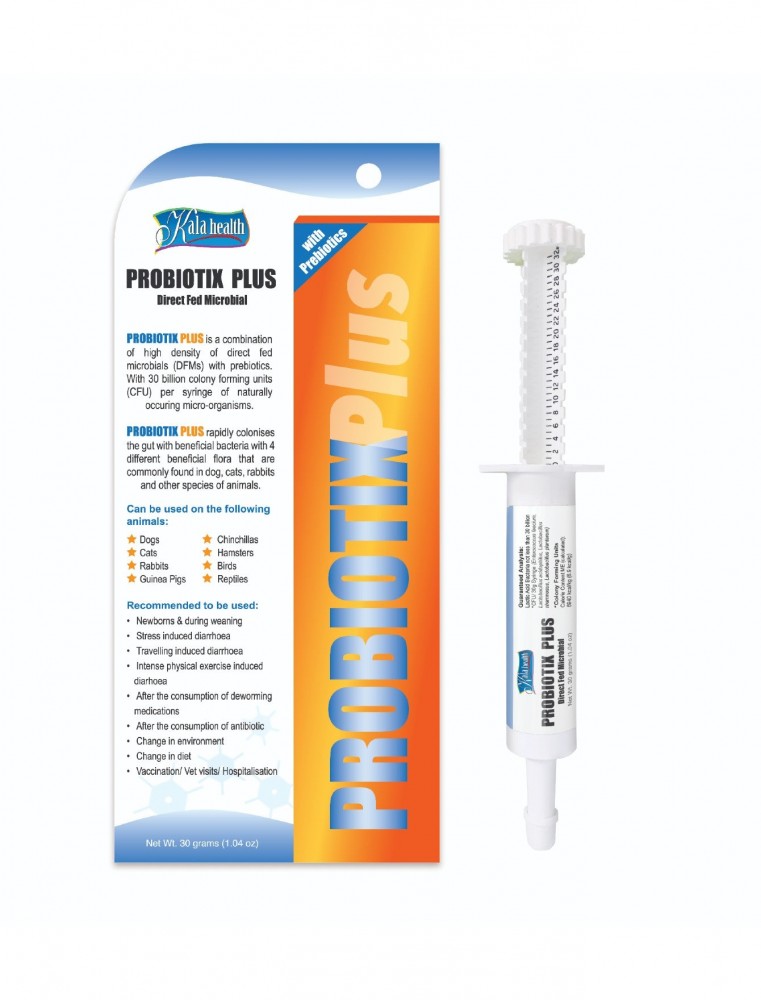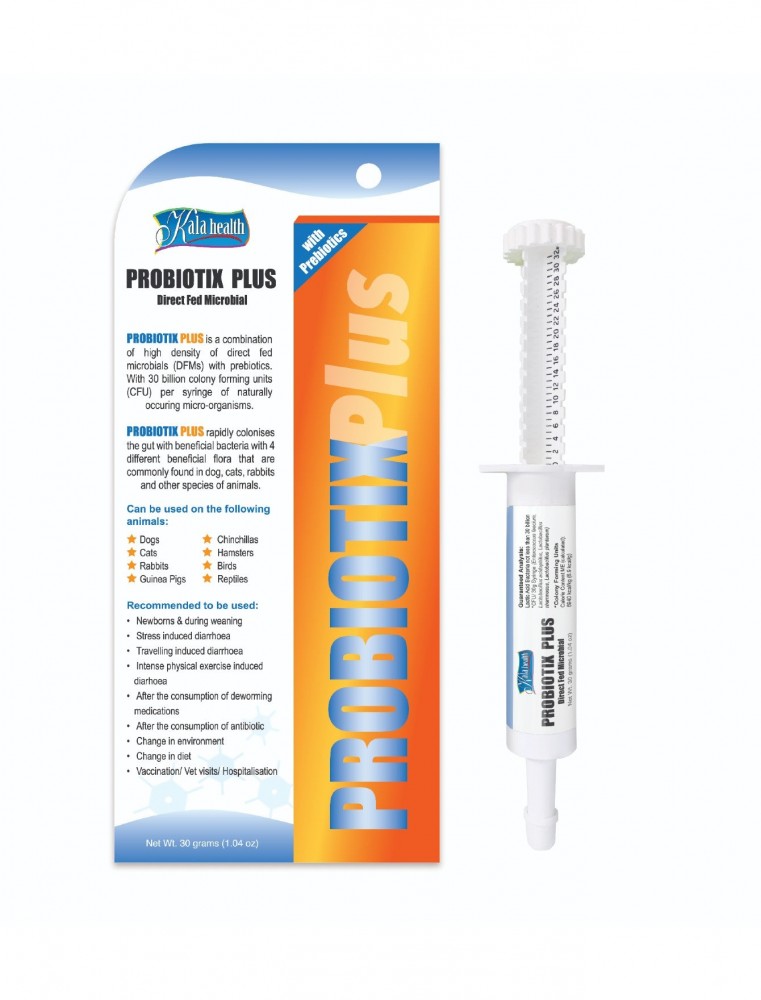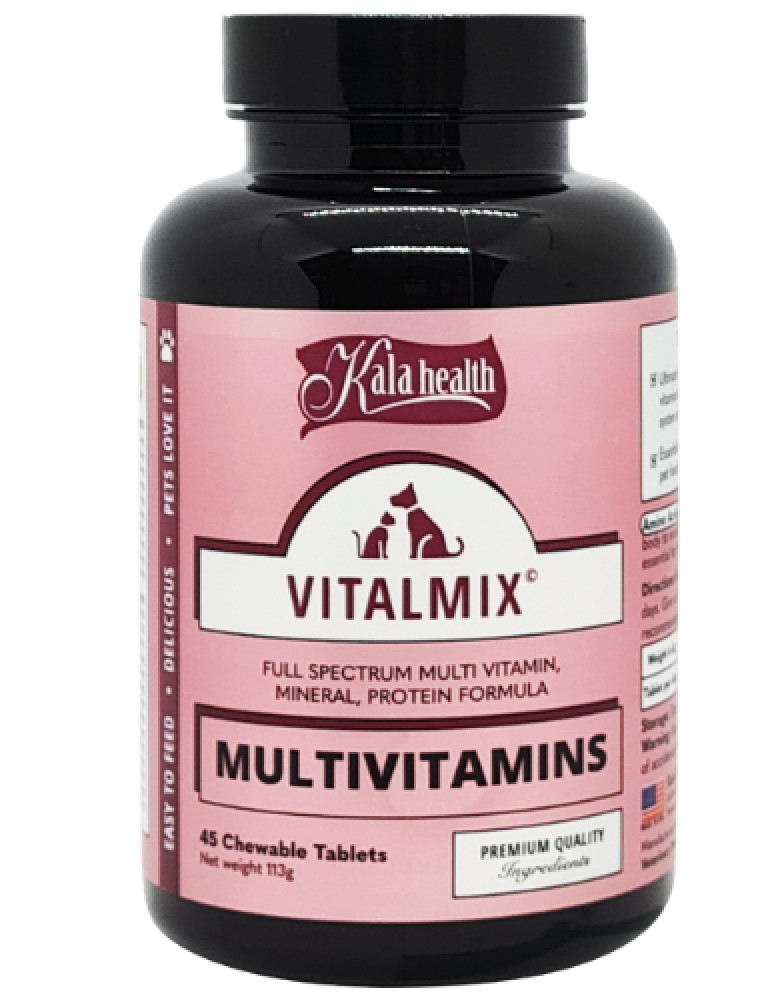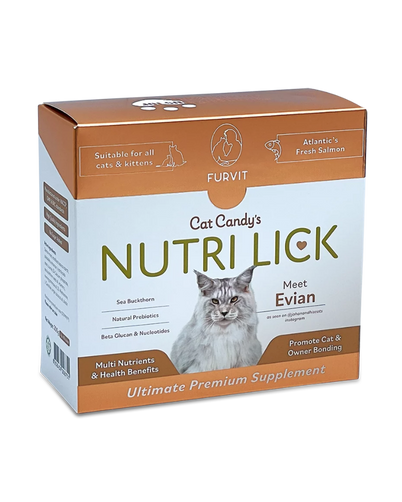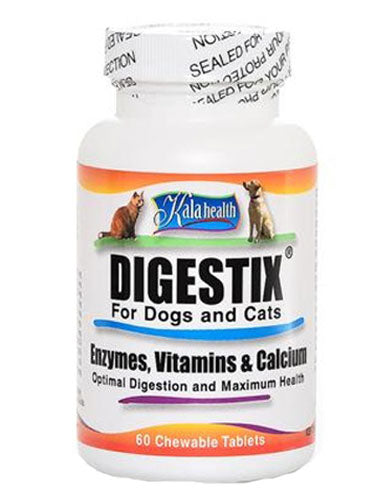

Kala Health Digestix Digestive Enzymes Pet Supplements 45cts
Save more by applying these Shop Vouchers to the items in your shopping cart.
Vouchers View All
Product Details
A combination of the three main classes of enzymes intended to improve the digestion of high protein/low carb diets is DIGESTIX® for Dogs and Cats. In combination with the body's own enzymes, it helps breakdown protein, fat and carbohydrates. It contains a wide variety of fungal source proteases, lipase and amylase engineered to be active in the gastrointestinal tract. Although less costly supplementary enzymes typically do not withstand the acidic conditions of the stomach from animal sources, fungal microbial enzymes are particularly immune to stomach acid. Throughout the GI tract, the digestive enzyme supplements used in Digestix® have proven efficacy. The enzyme activity of each of the components is determined and reported according to standard Food Chemical Codex procedures recognized by the FDA.
Background Information about Enzymes
Enzymes are specific proteins that play a key role in the body's mediation and acceleration of particular biochemical reactions. Based on the major food groups they help to break down, digestive enzymes are typically divided into three distinct classes: proteases (protein breakdown), lipases (fat breakdown) and carbohydrases (breakdown of carbohydrates). Each enzyme is unique to the activity it carries out-enzymes do not perform general work. In the acidic atmosphere of the stomach, some enzymes quickly break down, while others are active in the small intestines, where 90% of the nutrients in the food are absorbed.
For the efficient breakdown of food into nutrients that can then be assimilated, digestive enzymes are critical. Enzymatic breakdown is a multi-stage process that begins in the stomach when food meets saliva and ends in the small intestine, where specialized enzymes further split the mass of food and digestive fluids into the molecular structures of the different nutrients. So they may be absorbed into the circulatory systems.
In different sections of the digestive tract, enzymes are formed. Enzyme production slows down with growing age, and digestion becomes less successful. Therefore, as our companion animals get older, it makes growing sense to use supplementary digestive enzymes. When taken together with food, supplemental digestive enzymes are completely dedicated to the digestive process, while the same enzymes taken on an empty stomach are partially absorbed intact into the bloodstream where they appear to help restore and maintain healthy blood and tissue functions, and can have a beneficial effect on immune and inflammatory processes.
Digestix®Formula
Digestix®is a premium blend of digestive enzymes designed to optimize the digestion of typical canine and feline diets. It is contained in a tasty chewable tablet, making it very easy to offer companion animals. Digestix®is composed of enzymes and the Vitamin B Complex, carefully selected for their specificity and functionality.
Digestix®is a comprehensive digestive formula that includes a wide spectrum of enzymes and vitamins that aid and restore optimal digestion and metabolism of typical canine and feline foods. Digestix®contains the optimal blend of digestive enzymes at effective activity levels to achieve maximum digestion.
Proteases, or proteolytic enzymes, are a large group of enzymes involved in digesting long protein chains into short fragments, splitting the peptide bonds that link amino acid residues. During the digestion of proteins, hydrochloric acid and proteases break down the intact protein molecule into amino acids, which are then absorbed through the intestinal wall. When taken in higher quantities, proteases can help to cleanse the body by removing the unwanted protein from the circulatory system. This will help to clean up the blood stream, and restore energy and balance. Several studies have shown that orally ingested enzymes produced by fungi (Aspergillus oryzae, A. niger) and microbes (Bacillus subtilis) can bypass the acidic conditions of the stomach and reach the small intestine while still maintaining their enzymatic activity.
Lipasesare enzymes that hydrolyze (break down) lipids (fats), the ester bonds in triglycerides, to form fatty acids and glycerol. While too much fat in the diet can cause adverse health conditions, some fat is required. All cell membranes and other structures are made up of lipids, thus an adequate supply of essential fatty acids in the diet are important to ensure viable cells. Fats require special digestive action before absorption because the end products must be carried in a water medium (blood and lymph) in which fats are not soluble.
Carbohydrasesrefer to a group of enzymes whose catalytic function is to hydrolyze sugar and starch. The chief carbohydrase enzyme is amylase. Amylase is a calcium metalloenzyme, unable to function in the absence of calcium. Digestix®therefore includes calcium as one of its components. Amylase digests carbohydrates (polysaccharides) into smaller disaccharide units, eventually converting them into monosaccharides such as glucose. Carbohydrates in food are an important and immediate source of energy for the body. They may also be stored in the body as glycogen for future use.
Lysozyme, an enzyme primarily found in egg white, is responsible for breaking down the polysaccharide walls of many kinds of bacteria and thus it provides some protection against infection. It functions as a “natural antibiotic”, preventing pathogenic bacteria from causing harm.
Vitamins
Vitamin A:Helps the body resist bacterial and viral infections;
Vitamin B1 (Thiamin):Essential for carbohydrate metabolism; aids in digestion, circulation; prevents liquid retention; prevents constipation;
Vitamin B2 (Riboflavin):Essential for carbohydrate, fat and protein digestion and metabolism, produces energy;
Vitamin B3 (Niacin):Essential for carbohydrate, fat and protein digestion and metabolism; improves circulation; lowers cholesterol; aids in the production of stomach hydrochloric acid;
Vitamin B5 (Pantothenic Acid):Used to convert fats, carbohydrates and proteins into energy;
Vitamin B6 (Pyridoxine):Used in the digestive system for hydrochloric acid production, fat and protein utilization, antibody formation, and maintenance of sodium/potassium balance;
Vitamin B9 (Folic Acid):Used for hydrochloric acid production; aids in digestion, production of myelin, and protein metabolism;
Vitamin B12 (Cobalamin):Regulates red blood cell formation; used for the metabolism of carbohydrate, fat and protein.
Dextrates, Calcium Carbonate, Natural Flavoring, Whey Protein Concentrate, Maltodextrin, Stearic Acid, Silicon Dioxide, alpha- Amylase, Protease, Pepsin, Bromelain, Papain, Lipase, Lysozyme, Egg Albumin, Niacinamide, dl-alpha-Tocopheryl Acetate, Pantothenic Acid, Vitamin A Palmitate, Riboflavin, Cholecalceferol, Pyridoxine Hydro- chloride, Thiamine Mononitrate, Vitamin B12, Folic Acid.
Guaranteed Analysis
Per 1.3-Gram Tablet:
- Enzymes Min.
- Protease 3.0* 12.5 SAPU
- Protease 4.5* 21,000 HUT
- Protease 6.0* 1,000 HUT
- Pepsin (1:10,000)* 5 mg
- Papain* 140,000 FCCPU
- Bromelain* 145,000 FCCPU
- Amylase* 2,000 DU
- Lipase* 400 FIP
- Lysozyme 500 MCG
- Vitamins & Mineral Min.
- Calcium 100 mg
- Vitamin A 1,000 IU
- Vitamin D3 100 IU
- Vitamin E 5 IU
- Thiamine (Vitamin B1) 0.25 mg
- Riboflavin (Vitamin B2) 0.5 mg
- Pantothenic Acid 5 mg
- Niacin 4 mg
- Pyridoxine 0.33 mg
- Folic Acid 0.075 mg
- Vitamin B12 0.006 mg
*Not recognized as an essential nutrient by the AAFCO Dog Food Nutrient Profiles. This product is intended for intermittent or supplemental feeding only.
For best results, use daily. Administer as a treat or snack prior to feeding. May also be crumbled and mixed with pet food.
- Small dogs & cats (5-20 lbs) ½ tablet daily
- Mid-size dogs (21-50 lbs) 1 tablet daily
- Large dogs (51-80 lbs) 2 tablets daily
- Very large dogs (81-110 lbs) 3 tablets daily
- Giant breed dogs (over 110 lbs) 4-5 tablets daily
A combination of the three main classes of enzymes intended to improve the digestion of high protein/low carb diets is DIGESTIX® for Dogs and Cats. In combination with the body's own enzymes, it helps breakdown protein, fat and carbohydrates. It contains a wide variety of fungal source proteases, lipase and amylase engineered to be active in the gastrointestinal tract. Although less costly supplementary enzymes typically do not withstand the acidic conditions of the stomach from animal sources, fungal microbial enzymes are particularly immune to stomach acid. Throughout the GI tract, the digestive enzyme supplements used in Digestix® have proven efficacy. The enzyme activity of each of the components is determined and reported according to standard Food Chemical Codex procedures recognized by the FDA.
Background Information about Enzymes
Enzymes are specific proteins that play a key role in the body's mediation and acceleration of particular biochemical reactions. Based on the major food groups they help to break down, digestive enzymes are typically divided into three distinct classes: proteases (protein breakdown), lipases (fat breakdown) and carbohydrases (breakdown of carbohydrates). Each enzyme is unique to the activity it carries out-enzymes do not perform general work. In the acidic atmosphere of the stomach, some enzymes quickly break down, while others are active in the small intestines, where 90% of the nutrients in the food are absorbed.
For the efficient breakdown of food into nutrients that can then be assimilated, digestive enzymes are critical. Enzymatic breakdown is a multi-stage process that begins in the stomach when food meets saliva and ends in the small intestine, where specialized enzymes further split the mass of food and digestive fluids into the molecular structures of the different nutrients. So they may be absorbed into the circulatory systems.
In different sections of the digestive tract, enzymes are formed. Enzyme production slows down with growing age, and digestion becomes less successful. Therefore, as our companion animals get older, it makes growing sense to use supplementary digestive enzymes. When taken together with food, supplemental digestive enzymes are completely dedicated to the digestive process, while the same enzymes taken on an empty stomach are partially absorbed intact into the bloodstream where they appear to help restore and maintain healthy blood and tissue functions, and can have a beneficial effect on immune and inflammatory processes.
Digestix®Formula
Digestix®is a premium blend of digestive enzymes designed to optimize the digestion of typical canine and feline diets. It is contained in a tasty chewable tablet, making it very easy to offer companion animals. Digestix®is composed of enzymes and the Vitamin B Complex, carefully selected for their specificity and functionality.
Digestix®is a comprehensive digestive formula that includes a wide spectrum of enzymes and vitamins that aid and restore optimal digestion and metabolism of typical canine and feline foods. Digestix®contains the optimal blend of digestive enzymes at effective activity levels to achieve maximum digestion.
Proteases, or proteolytic enzymes, are a large group of enzymes involved in digesting long protein chains into short fragments, splitting the peptide bonds that link amino acid residues. During the digestion of proteins, hydrochloric acid and proteases break down the intact protein molecule into amino acids, which are then absorbed through the intestinal wall. When taken in higher quantities, proteases can help to cleanse the body by removing the unwanted protein from the circulatory system. This will help to clean up the blood stream, and restore energy and balance. Several studies have shown that orally ingested enzymes produced by fungi (Aspergillus oryzae, A. niger) and microbes (Bacillus subtilis) can bypass the acidic conditions of the stomach and reach the small intestine while still maintaining their enzymatic activity.
Lipasesare enzymes that hydrolyze (break down) lipids (fats), the ester bonds in triglycerides, to form fatty acids and glycerol. While too much fat in the diet can cause adverse health conditions, some fat is required. All cell membranes and other structures are made up of lipids, thus an adequate supply of essential fatty acids in the diet are important to ensure viable cells. Fats require special digestive action before absorption because the end products must be carried in a water medium (blood and lymph) in which fats are not soluble.
Carbohydrasesrefer to a group of enzymes whose catalytic function is to hydrolyze sugar and starch. The chief carbohydrase enzyme is amylase. Amylase is a calcium metalloenzyme, unable to function in the absence of calcium. Digestix®therefore includes calcium as one of its components. Amylase digests carbohydrates (polysaccharides) into smaller disaccharide units, eventually converting them into monosaccharides such as glucose. Carbohydrates in food are an important and immediate source of energy for the body. They may also be stored in the body as glycogen for future use.
Lysozyme, an enzyme primarily found in egg white, is responsible for breaking down the polysaccharide walls of many kinds of bacteria and thus it provides some protection against infection. It functions as a “natural antibiotic”, preventing pathogenic bacteria from causing harm.
Vitamins
Vitamin A:Helps the body resist bacterial and viral infections;
Vitamin B1 (Thiamin):Essential for carbohydrate metabolism; aids in digestion, circulation; prevents liquid retention; prevents constipation;
Vitamin B2 (Riboflavin):Essential for carbohydrate, fat and protein digestion and metabolism, produces energy;
Vitamin B3 (Niacin):Essential for carbohydrate, fat and protein digestion and metabolism; improves circulation; lowers cholesterol; aids in the production of stomach hydrochloric acid;
Vitamin B5 (Pantothenic Acid):Used to convert fats, carbohydrates and proteins into energy;
Vitamin B6 (Pyridoxine):Used in the digestive system for hydrochloric acid production, fat and protein utilization, antibody formation, and maintenance of sodium/potassium balance;
Vitamin B9 (Folic Acid):Used for hydrochloric acid production; aids in digestion, production of myelin, and protein metabolism;
Vitamin B12 (Cobalamin):Regulates red blood cell formation; used for the metabolism of carbohydrate, fat and protein.
Dextrates, Calcium Carbonate, Natural Flavoring, Whey Protein Concentrate, Maltodextrin, Stearic Acid, Silicon Dioxide, alpha- Amylase, Protease, Pepsin, Bromelain, Papain, Lipase, Lysozyme, Egg Albumin, Niacinamide, dl-alpha-Tocopheryl Acetate, Pantothenic Acid, Vitamin A Palmitate, Riboflavin, Cholecalceferol, Pyridoxine Hydro- chloride, Thiamine Mononitrate, Vitamin B12, Folic Acid.
Guaranteed Analysis
Per 1.3-Gram Tablet:
- Enzymes Min.
- Protease 3.0* 12.5 SAPU
- Protease 4.5* 21,000 HUT
- Protease 6.0* 1,000 HUT
- Pepsin (1:10,000)* 5 mg
- Papain* 140,000 FCCPU
- Bromelain* 145,000 FCCPU
- Amylase* 2,000 DU
- Lipase* 400 FIP
- Lysozyme 500 MCG
- Vitamins & Mineral Min.
- Calcium 100 mg
- Vitamin A 1,000 IU
- Vitamin D3 100 IU
- Vitamin E 5 IU
- Thiamine (Vitamin B1) 0.25 mg
- Riboflavin (Vitamin B2) 0.5 mg
- Pantothenic Acid 5 mg
- Niacin 4 mg
- Pyridoxine 0.33 mg
- Folic Acid 0.075 mg
- Vitamin B12 0.006 mg
*Not recognized as an essential nutrient by the AAFCO Dog Food Nutrient Profiles. This product is intended for intermittent or supplemental feeding only.
For best results, use daily. Administer as a treat or snack prior to feeding. May also be crumbled and mixed with pet food.
- Small dogs & cats (5-20 lbs) ½ tablet daily
- Mid-size dogs (21-50 lbs) 1 tablet daily
- Large dogs (51-80 lbs) 2 tablets daily
- Very large dogs (81-110 lbs) 3 tablets daily
- Giant breed dogs (over 110 lbs) 4-5 tablets daily
Ratings & Reviews
4.9 18 reviews
Showing 10 of 18 reviews
Good
Jul 28, 2022, Mary
Good
Tasty
Dec 09, 2020, Li
Helps with dog bowl movement. Dog loves it.
reliable supplement
Oct 24, 2022, Edmund Teo
good reliable supplement. 3rd time buying. gives all the necessary enzymes that my shiba needs
My fusspot mutts love it!
Oct 17, 2019, Karen
Easy to administer as my difficult-to-please dogs see it as a treat.
Not sure if it works
Mar 30, 2020, Ammerline
bought for my puppy. Feed half a tablet daily with his food. After started to feed him this supplement, his poo times delay alot. Not sure if becouse the food is being breakup.
.gif)



